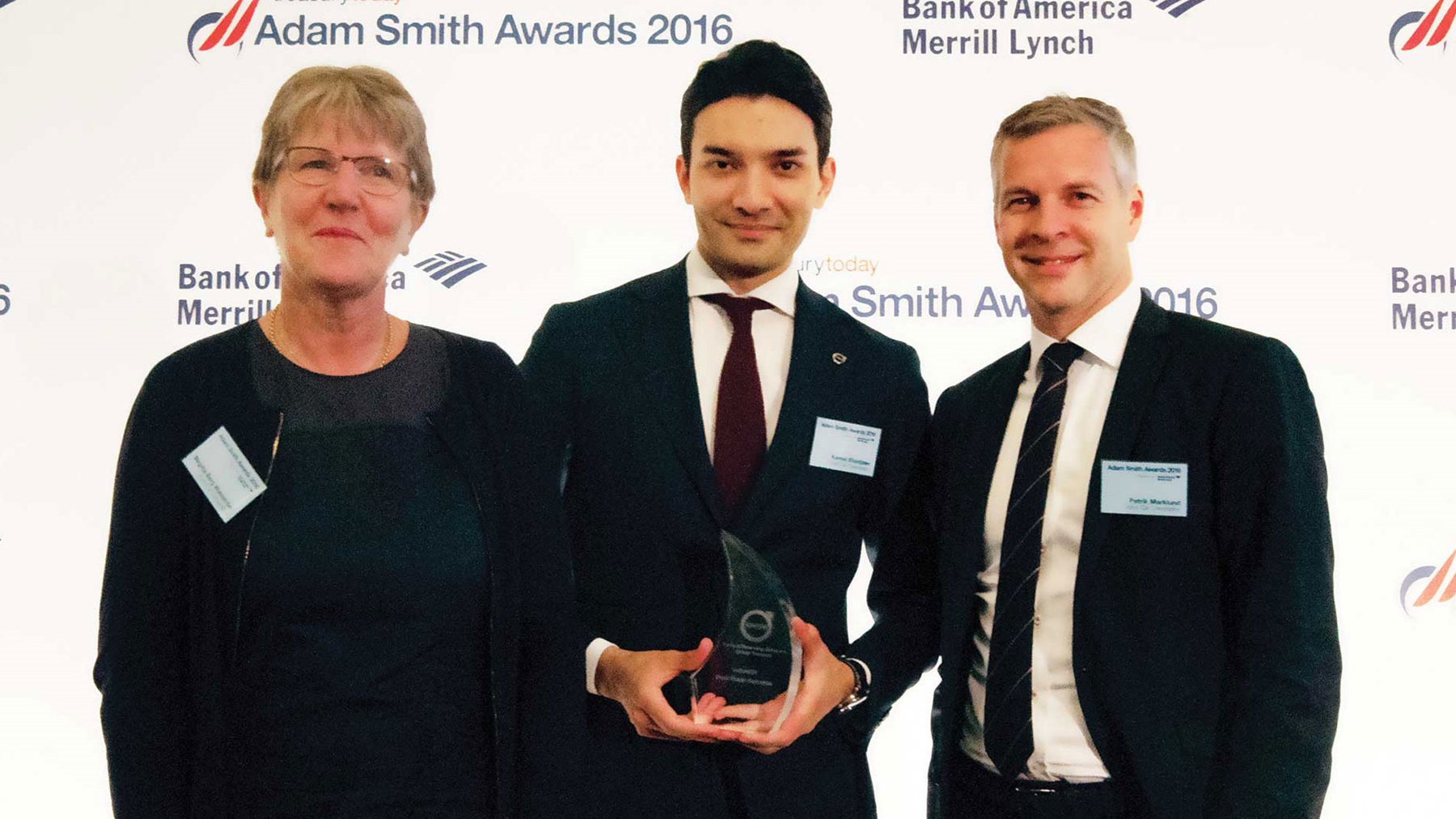
Photo of Birgitta Berg Wahlström, Kamol Khodjaev and Patrik Marklund, Volvo Cars.
This solution enables Volvo Cars to connect to their core banks by deploying a single supply chain finance web-based online platform which has improved the company’s working capital management KPIs. Hear how they achieved this.
Kamol Khodjaev
Head of Trade & Financing Solutions

Volvo Car Group produces a premium range of cars that includes sedans, wagons, sports wagons, cross country cars and SUVs.
The challenge
Since 2010, and its acquisition by Zhejiang Geely Holdings, Volvo Cars has been acting on a stand-alone basis and since then it has been on a transformational journey. As part of the finance function transformation, the company has looked for ways to better manage and optimise its working capital performance. Central to this has been seeking optimisation of its cash conversion cycle which was identified as a key financial performance indicator and education for the business units.
To do this the company has sought improvements in numerous areas including:
- Optimisation of inventory measured as days inventory outstanding (DIO): there have been a number of activities in place to optimise inventory flows by operational improvement and smart value chain transformation where the treasury team has taken the consulting role.
- Optimisation of receivables from sales measured as days sales outstanding (DSO): as an addition to commercial and operational improvement, the finance function has been controlling and securing commercial credit risks by approved financial guarantees and discounting.
- Optimisation of payables from purchasing measured as days payable outstanding (DPO): payment terms have been taken into account as one of the commercial objectives of the company, taking fair and market practice into consideration. As a further step, to give suppliers and Volvo Cars’ commercial wing flexible support, the company has initiated a supply chain finance programme to increase visibility and efficiency of its payment flows and flexibility of its working capital within its supplier chain.
The solution
Although all of these projects have been adding benefit, it was the supply chain finance (SCF) solution implemented by the company that has been standing out in recent years, being a relatively new product among other trade solutions. The SCF solution was implemented after in-depth cross-functional pre-study following thorough RFI and RFP process, wherein Volvo evaluated a number of alternative platforms offered by the banks and independent platform providers. The company ultimately decided to use a multi-banking solution offered by a bank-agnostic platform. The rationale behind this was that it enabled them to connect multiple banks under one online transparent SCF platform.
“The chief purpose of this strategy is not to be dependent upon one or two single bank platforms, but rather having one plug-in multi-banking solution where several banks can participate, having fair chances with respective advantages in geography, currency and appetite,” explains Kamol Khodjaev, Head of Trade & Financing Solutions at Volvo Cars.
With the solution decided upon, the next task was to ensure that Volvo Cars as a company understood the rationale and purpose of the SCF solution. Therefore, as part of the preparation before going live, extensive training was delivered by the treasury department around the importance of financial supply chain, its transparency and flexibility for the purchasing organisation. As Khodjaev explains: “The training, cooperative approach and setting up balanced objectives have fully engaged our purchasing team into the programme and allowed them to contribute to both the strategy and launch of the programme.”
Following this extensive preparation process, the dedicated cross-functional team – featuring treasury, procurement, accounts payable, IT and legal functions – at Volvo Cars has been implementing this programme by inviting some of its suppliers to join initially, before rolling it out more broadly.
Best practice and innovation
The SCF programme has not only delivered its objective in finding a flexible, transparent and optimal solution for both commercial sides (buyer and supplier) in a relatively short time to reach the company’s objectives. It has also fostered a valuable cross functional cooperation between the company’s purchasing and treasury departments, delivering new business solutions and ideas.
Moreover, as a part of the technical preparation and integration of supply chain finance into Volvo Cars’ landscape of operations, other departments have also been involved including IT, accounts payable, legal and accounting governance, which made the project truly cross-functional.
Khodjaev concludes: “We manage a range of financial trade solutions to enable business operations to achieve the company’s goals in as fast and optimal a way as possible to meet the dynamic economic development of today’s world. The SCF programme was one of those solutions, which has being of the most cross-functional and inter-disciplinary projects which we had. We are very proud of the programme which has been successfully implemented with many suppliers onboarded in a relatively short time through strong cooperation between purchasing and treasury.”
Key benefits
- Speedy and effective implementation/supplier on-boarding.
- True win-win solution for all parties.
- Successfully utilised in the commercial trade.
- Strong cross-functional engagement.